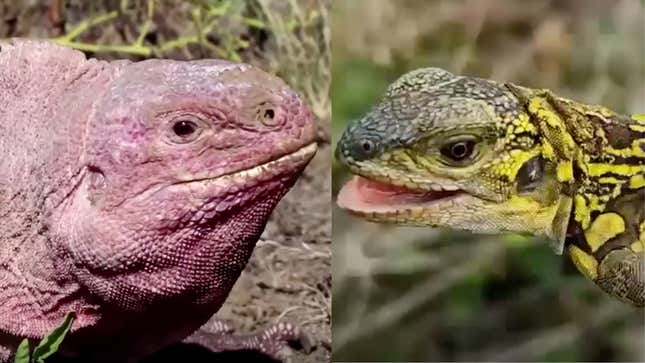Iguanas are a popular pet reptile that come in a wide variety of colors and sizes. While iguanas may look similar at first glance, there are some key differences between males and females that can help determine their sex. Paying attention to physical characteristics, behaviors, and living requirements can help provide proper care for male vs female iguanas.
Physical Characteristics

- Male iguanas tend to be larger, often reaching up to 6 feet long including their tail. Females are typically smaller, growing to about 4 feet long at maturity.
- Male iguanas have larger, blockier jowls and heads compared to females who have more slender, smoother features.
- The presence of large femoral pores on the underside of the back legs indicates a male iguana. These pores are used to release pheromones and are not present on females.
- Mature male iguanas develop a throat fan or dewlap under their chin which is brighter in color. Females may have a small dewlap but it is less pronounced.
- Male iguanas have male vs female iguana larger spikes running along their backs which are more pronounced compared to females.
Behaviors
- Male iguanas can be quite aggressive and territorial, especially during breeding season. They often bob their heads and display their dewlap to appear more threatening.
- Females are generally more docile than males but can still be defensive during nesting season when protecting their eggs.
- Male iguanas vigorously pursue female iguanas and engage in mating rituals during the spring breeding season.
- Females dig nests and guard their nest sites in preparation for laying eggs in the summer months.
Living Requirements
- Male iguanas may require a larger enclosure as they grow bigger than females. A minimum 6 foot long x 3 foot wide x 4 foot tall enclosure is recommended.
- Female iguanas may tolerate cohabitation with a male but multiple females should not be housed together due to aggression and competition for resources.
- Female iguanas require specific nesting sites and loose substrate to dig in prior to egg laying. They also need calcium-rich foods before and after producing eggs.
- Male iguanas are solitary and very territorial. They should always be housed separately from other males to prevent fighting and injury.
Properly identifying the sex of pet iguanas is important to meet their individual needs for housing, nutrition, and behavior. While subtle, paying attention to the physical differences, behaviors, and living requirements of males and females can help provide each iguana with proper care and handling. Their lifespans can reach 15-20 years so making the effort to differentiate between the sexes will lead to many happy and healthy years with an iguana companion.
FAQs About Male vs Female Iguana
Can male and female iguanas be kept together in the same enclosure?
It’s generally not recommended to keep male and female iguanas together, as males may become aggressive and harm females, especially during breeding season. Separate enclosures are safer.
Do male or female iguanas tend to be more aggressive?
Males tend to be more aggressive than females, particularly when they are competing for territory or during mating season. Female iguanas are generally less aggressive.
Are there specific care considerations for male and female iguanas?
Both genders require similar care in terms of diet, habitat, and temperature. However, female iguanas may have additional needs if they become gravid (pregnant), such as a suitable nesting area.
Do male or female iguanas have different reproductive characteristics?
Male iguanas have hemipenes for mating, while females lay eggs. Females exhibit nesting behaviors and may require a nesting box if kept in captivity.
Are there any health differences between male and female iguanas?
Health differences between male and female iguanas are primarily related to reproductive health. Females can develop egg-related issues, such as egg binding, if not provided with proper conditions for laying eggs. Males may experience health issues related to aggression or stress. Regular veterinary check-ups are essential for both genders.



